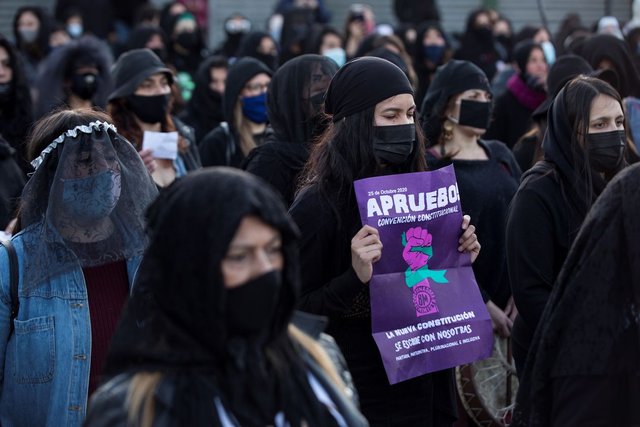Chile’s Suicide Mission (Wall Street Journal)
Chile’s Suicide Mission
A new constitution is likely to make the country poorer, more corrupt and less free.
By Mary Anastasia O’Grady
Oct. 18, 2020 4:29 pm ET
Protesters call for a new constitution in Valparaiso, Chile, Oct. 14.
PHOTO: ALBERTO VALDES/SHUTTERSTOCK
A free society is never more at risk than when expectations are rising faster than outcomes. Of all the efforts to explain why Chile is on the cusp of collective political and economic suicide, this truism makes the most sense.
On Oct. 25 Chileans will vote on whether the country needs a new constitution. Polls indicate that the “yes” vote will prevail even as the process of rewriting the highest law in the land is shaping up to be a disaster.
A new constitution is likely to put at risk the model of democratic capitalism that brought Chilean poverty to below 10% in 2018, from nearly 70% in 1990. Chile also had the highest social mobility in a 2018 Organization of Economic Cooperation and Development study of 16 member countries. Why there is popular backing to blow up a system that has delivered so much success is hard to understand.
One clue is the economic sluggishness that Socialist President Michelle Bachelet (2014-18) brought on with higher taxes and heavy regulation. Center-right President Sebastian Piñera hasn’t been able to turn things around. Yet low growth on its own doesn’t explain this radical step.
For sure heavy doses of Marxist indoctrination at Chilean universities and income “equality” claptrap from intellectuals and the media have tilted the country to the left.
But Alexis de Tocqueville put his finger on something in “Democracy in America,” when he wrote that “the hatred that men bear to privilege increases in proportion as privileges become fewer and less considerable, so that democratic passions would seem to burn most fiercely just when they have least fuel. . . . When all conditions are unequal, no inequality is so great as to offend the eye, whereas the slightest dissimilarity is odious in the midst of general uniformity.”
This rings true in Chile where, as the population has become better off—though damaged by the economic stagnation midwifed by Ms. Bachelet—it has also become angrier. Feelings of well-being and security have waned while the political forest has been piled high with the dry tinder of collectivist idealism.
Many Chileans seem to believe that a new constitution will make things right, à la Hugo Chávez’s Venezuela circa early 2000s. The analogy isn’t perfect but, as Mark Twain observed about history, it rhymes.
The hard left justifies its demand for a new constitution by pointing to Gen. Augusto Pinochet, who ruled the country as a dictator in 1980 when the current constitution was adopted. Yet that constitution established a process for the return of democracy beginning in 1988. Pinochet handed over power peacefully in 1990.
A string of democratically elected center-left governments up to 2010 amended the constitution to deepen democracy while protecting private property and central-bank independence. Nevertheless militants have convinced Chileans that the source of their unhappiness is the original document.
Referendum backers say it is a “democratic” process. It is certainly majoritarian. But Chileans are bound to be disappointed if higher living standards and greater opportunity are the goal. The nation will be lucky if it finishes the exercise on par with the impoverished Argentine welfare state.
It’s a good bet that the new constitution will try to satisfy the populist outcry for social justice by increasing the monopoly power of the state to redistribute wealth. Unless Chileans prove exceptional in their capacity to avoid this temptation, expect a document that reads like a litany of unattainable aspirations.
Former Brazilian President Fernando Henrique Cardoso, hardly a man of the right, warns of the problem in his 2006 memoir, “The Accidental President of Brazil.” As his country emerged from dictatorship in 1987 and its Congress prepared to draft a new constitution, Mr. Cardoso was put in charge of rule-writing. This gave him a front-row seat as the process unfolded. “Every Brazilian interest group imaginable emerged with demands. . . . No matter how ridiculous the request, Congress was never able to turn it down.”
Mr. Cardoso called the privileges enshrined in the final version “absurd,” and not only because Brazil was too poor to deliver on them. It was also “trying to create a welfare state” at the “moment in history when the welfare states of Europe were collapsing.”
In Chile both the left and the right expect to have blocking minorities in the convention, and this is supposed to moderate the outcome. Yet unless the final version also requires two-thirds approval by the convention—a point not yet agreed on—there is a high likelihood that the new constitution will be an incoherent mess.
Things will get even dicier if an agreement is not reached. After all, the left won this referendum after Mr. Piñera failed to contain its violent burning-and-looting rampage unleashed a year ago on the nation. So it is not so much an exercise in civics as it is a surrender to left-wing terrorists who are unlikely to back down because they lose at politics.
Write to O’[email protected].
https://www.wsj.com/articles/chiles-suicide-mission-11603052967
